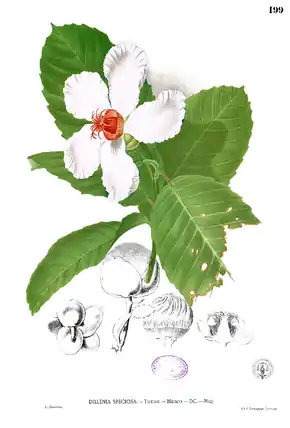Dilleniaceae
Les Dilleniaceae sont une famille de plantes dicotylédones qui comprend 400 espèces réparties en 10 à 11 genres.

| Règne | Plantae |
|---|---|
| Sous-règne | Tracheobionta |
| Division | Magnoliophyta |
| Classe | Magnoliopsida |
| Sous-classe | Dilleniidae |
| Ordre | Dilleniales |

| Clade | Angiospermes |
|---|---|
| Clade | Dicotylédones vraies |
| Clade | Noyau des Dicotylédones vraies |
| Ordre |
n/a selon APG III Dilleniales selon APWebsite |
| Famille | Dilleniaceae |
Ce sont des arbres, des arbustes, des lianes et quelques plantes herbacées, certains adaptés aux zones arides, des régions tempérées-chaudes, subtropicales et tropicales.
Étymologie
Le nom vient du genre-type Dillenia nommé par Linné en hommage au botaniste britannique d'origine allemande Johann Jacob Dillenius (1684–1747), qui accuillit Linné à Oxford in 1736[1].
Classification
En classification phylogénétique APG II (2003)[2] cette famille était directement rattachée au noyau des Dicotylédones vraies.
Le Angiosperm Phylogeny Website les situe dans l'ordre des Dilleniales.
En classification phylogénétique APG III (2009)[3] cette famille est toujours rattachée au noyau des Dicotylédones vraies.
En classification phylogénétique APG IV (2016)[4] l'ordre des Dilleniales est de nouveau admis.
Liste des genres
Selon NCBI (17 janvier 2017)[5] :
- Acrotrema
- Curatella
- Davilla
- Dillenia
- Doliocarpus
- Hibbertia
- Neodillenia
- Pachynema
- Pinzona
- Schumacheria
- Tetracera
Selon Angiosperm Phylogeny Website (17 janvier 2017)[6] :
- Acrotrema Jack
- Curatella Loefl.
- Davilla Vand.
- Didesmandra Stapf
- Dillenia L.
- Doliocarpus Rol.
- Hibbertia Andrews
- Neodillenia Aymard
- Pachynema R.Br. ex DC.
- Pinzona Mart. & Zucc.
- Schumacheria Vahl
- Tetracera L.
DELTA Angio (17 janvier 2017)[7]
- Acrotrema Jack
- Curatella Loefl.
- Davilla Vand.
- Didesmandra Stapf
- Dillenia L.
- Doliocarpus Rol.
- Hibbertia Andrews
- Neodillenia Aymard
- Pachynema R.Br. ex DC.
- Pinzona Mart. & Zucc.
- Schumacheria Vahl
- Tetracera L.
Selon ITIS (17 janvier 2017)[8] :
- Dillenia L.
- Doliocarpus Roland.
- Pinzona Mart. & Zucc.
Liste des espèces
Selon NCBI (27 avr. 2010)[9] :
- genre Acrotrema
- Acrotrema costatum
- genre Curatella
- genre Davilla
- Davilla elliptica
- Davilla flexuosa
- Davilla kunthii
- Davilla cf. kunthii Zartman s.n.
- Davilla lacunosa
- Davilla nitida
- genre Dillenia
- Dillenia alata
- Dillenia hookeri
- Dillenia indica
- Dillenia parkinsonii
- Dillenia philippinensis
- Dillenia retusa
- Dillenia suffruticosa
- Dillenia triquetra
- Dillenia turbinata
- Dillenia sp. 8417
- genre Doliocarpus
- Doliocarpus elegans
- Doliocarpus major
- Doliocarpus multiflorus
- Doliocarpus subandinus
- Doliocarpus validus
- genre Hibbertia
- Hibbertia amplexicaulis
- Hibbertia aspera
- Hibbertia banksii
- Hibbertia baudouinii
- Hibbertia bracteata
- Hibbertia commutata
- Hibbertia conspicua
- Hibbertia cuneiformis
- Hibbertia dentata
- Hibbertia dilatata
- Hibbertia drummondii
- Hibbertia echiifolia
- Hibbertia empetrifolia
- Hibbertia exasperata
- Hibbertia fasciculata
- Hibbertia goyderi
- Hibbertia hamulosa
- Hibbertia hermanniifolia
- Hibbertia hypericoides
- Hibbertia juncea
- Hibbertia microphylla
- Hibbertia salicifolia
- Hibbertia saligna
- Hibbertia scandens
- Hibbertia sphenandra
- Hibbertia vestita
- Hibbertia volubilis
- genre Pachynema
- Pachynema junceum
- Pachynema sphenandrum
- genre Pinzona
- Pinzona coriacea
- genre Schumacheria
- Schumacheria alnifolia
- Schumacheria sp. Chase 308
- Schumacheria sp. SH1999
- genre Tetracera
- Tetracera asiatica
- Tetracera billardierei
- Tetracera empedoclea
- Tetracera masuiana
- Tetracera nordtiana
- Tetracera oblongata
- Tetracera parviflora
- Tetracera portobellensis
- Tetracera scandens
- Tetracera volubilis
Notes et références
- (en) Maarten J M Christenhusz, Michael F Fay et Mark W. Chase, Plants of the World : An Illustrated Encyclopedia of Vascular Plants, Chicago, The University of Chicago Press, , 792 p. (ISBN 978-0-2265-2292-0), p. 231
- (en) Angiosperm Phylogeny Group, « An update of the Angiosperm Phylogeny Group classification for the orders and families of flowering plants: APG II », Botanical Journal of the Linnean Society, Wiley-Blackwell, Linnean Society of London et OUP, vol. 141, no 4, , p. 399–436 (ISSN 0024-4074 et 1095-8339, DOI 10.1046/J.1095-8339.2003.T01-1-00158.X)
- (en) Angiosperm Phylogeny Group, « An update of the Angiosperm Phylogeny Group classification for the orders and families of flowering plants: APG III », Botanical Journal of the Linnean Society, Wiley-Blackwell, Linnean Society of London et OUP, vol. 161, no 2, , p. 105–121 (ISSN 0024-4074 et 1095-8339, DOI 10.1111/J.1095-8339.2009.00996.X)
- (en) Angiosperm Phylogeny Group, « An update of the Angiosperm Phylogeny Group classification for the orders and families of flowering plants: APG IV », Botanical Journal of the Linnean Society, Wiley-Blackwell, Linnean Society of London et OUP, vol. 181, no 1, , p. 1-20 (ISSN 0024-4074 et 1095-8339, DOI 10.1111/BOJ.12385)
- NCBI, consulté le 17 janvier 2017
- Stevens, P. F. (2001 onwards). Angiosperm Phylogeny Website. Version 14, July 2017 [and more or less continuously updated since]." will do. http://www.mobot.org/MOBOT/research/APweb/, consulté le 17 janvier 2017
- DELTA Angio, consulté le 17 janvier 2017
- Integrated Taxonomic Information System (ITIS), www.itis.gov, CC0 https://doi.org/10.5066/F7KH0KBK, consulté le 17 janvier 2017
- NCBI, consulté le 27 avr. 2010
Liens externes
- (en) Référence Flora of China : Dilleniaceae
- (en) Référence Madagascar Catalogue : Dilleniaceae
- (en) Référence Flora of Pakistan : Dilleniaceae
- (en) Référence Angiosperm Phylogeny Website : Dilleniaceae ()
- (en) Référence Kew Garden World Checklist : Dilleniaceae
- (en) Référence Jardin botanique du Missouri : Dilleniaceae (images de Madagascar)
- (en) Référence DELTA Angio : Dilleniaceae Salisb.
- (en) Référence Tree of Life Web Project : Dilleniaceae
- (en) Référence Catalogue of Life : Dilleniaceae Salisb. (consulté le )
- (en) Référence Paleobiology Database : Dilleniaceae Salisbury
- (fr+en) Référence ITIS : Dilleniaceae
- (en) Référence NCBI : Dilleniaceae (taxons inclus)
- (en) Référence GRIN : famille Dilleniaceae Salisb. (+liste des genres contenant des synonymes)
- (en) Référence FloraBase (Australie-Occidentale) : classification Dilleniaceae
- Portail de la botanique